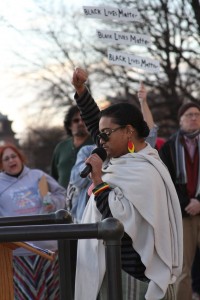 I don’t attend marches or really believe in rallying. I understand the concept of solidarity and support, but I have this thing about fragmented demonstrations preaching to the choir under time constraints, and size limitations set to a government issued permit to exercise a First Amendment right. But in the cold of a January Saturday morning, I gathered my 13-year-old daughter and bused it down to the State House for the Women’s March. As stated by WPRI news, “Demonstrators gathered to speak out against racism, sexism and discrimination, among other issues, which they see could worsen under a Trump administration.” And I couldn’t agree more. This march, I didn’t see as a political statement for one group, for one situation, for a single cause.
I don’t attend marches or really believe in rallying. I understand the concept of solidarity and support, but I have this thing about fragmented demonstrations preaching to the choir under time constraints, and size limitations set to a government issued permit to exercise a First Amendment right. But in the cold of a January Saturday morning, I gathered my 13-year-old daughter and bused it down to the State House for the Women’s March. As stated by WPRI news, “Demonstrators gathered to speak out against racism, sexism and discrimination, among other issues, which they see could worsen under a Trump administration.” And I couldn’t agree more. This march, I didn’t see as a political statement for one group, for one situation, for a single cause.
March being the month were we nationally celebrate women, I thought it right to continue the conversation of what exactly happened on January 21, 2017. I was fortunate enough to catch up with Reza Clifton, artist, educator, creator, writer, DJ and the final speaker on the stage or the Rhode Island chapter of the Women’s March.
Reza Clifton: I just want to say, we were celebrating diversity, and yet not all of us were surprised, some of us saw the writing on the wall. Several of the speakers who had gone on before me talked about feeling one way November 8 and then feeling totally different on November 9, and I just couldn’t connect with that.
Christopher Johnson (Motif): So I wanted to talk about the diversity that we saw on that stage. I was in awe of the youth who had such great speaking voice and so much to say, and then we saw Rose Weaver, who seemed to be the switch from the youth to adults and it wasn’t per normal, white-dominated space.
RC: I think it’s important to note that, while certainly there have been forms of psychic violence, psychological violence experienced by women of color in feminist spaces that coexist alongside the fact that there was diversity at the rally, and that’s really important. Anyone who can’t acknowledge that, I know that I can’t build with you. If you can’t believe that they can coexist, then you are in a really negative and or non-collaborative space.
CJ: So is there a real healing that needs to happen first, with psychological violence in the feminist spaces, or are we as a people just jumping in with both feet and skipping some necessary steps?
RC: I’m not as clear, my academic foundation is more rooted in the Black Freedom movement experience than in feminism, and my feminism is in fact informed and inspired in a large part by the movement for black freedom. I will say, what I am feeling is the answer is yes because a lot of people, that day, and face to face, and on social media are sharing photos, and video clips of women of all different racial backgrounds and ethnicities, and a childhood friend of mine with a disability was there shouting, and to know she felt included is stunningly beautiful to me, because that is an area where trauma and victimization is the regular. So I do think there is room for inclusivity.
Here is a poem written by Reza and performed at the Women’s march:
I Will Rise
By Reza Clifton
It would be too easy to say that I rise like a
Phoenix
From the Ashes
No.
I rise like an earthworm through mounds and
layers of dirt
To get to the nourishment I need above ground.
I rise like the women (and fellas) who’ve showed
up today
To march, to partner, to dream, to resist.
I rise like the woman in the countryside half-way
around the world
Who must fight time and nature
To gather and supply water and firewood to her
husband and family.
I rise like the weeds in my concrete driveway
Whose growth I admire and consider remarkable
Rather than joining the legions of those who
undermine and kill the plants.
I rise like my ancestors and forefathers
Through the piercing and
blazing pricks and lashes
Of whips, firehoses and bullets
And like my foremothers who coordinated the
Underground Railroad
And ushered in critical health services for women
I rise like the consciousness of the people who
confront injustice,
Remove barriers blocking the view of poverty,
And who proclaim and exclaim “I am you, you
are me, and we will do this!”
I will Rise. I will Rise. I will Rise.
And as I rise
I’ll see you up there.

